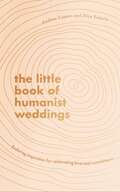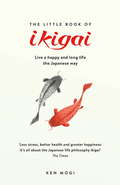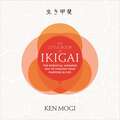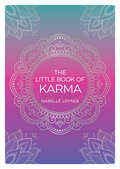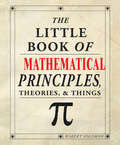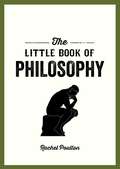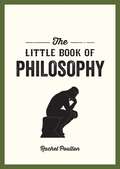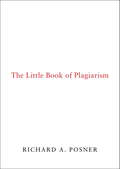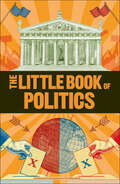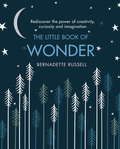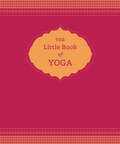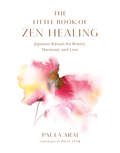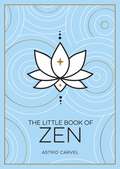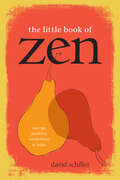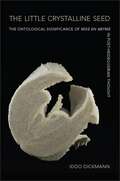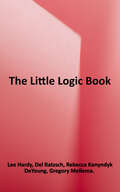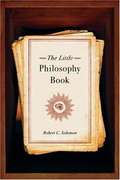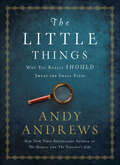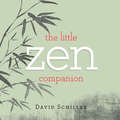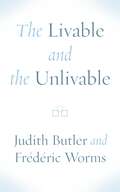- Table View
- List View
The Little Book of Humanist Weddings: Enduring inspiration for celebrating love and commitment
by Andrew Copson Alice RobertsFrom the authors of the Sunday Times bestseller The Little Book of HumanismA humanist wedding ceremony allows couples the freedom to express their love in a completely personal way - and choose what marriage means to them.In a beautiful collection of insights from humanist celebrants, plus quotes, poems and meditations from humanist writers and thinkers throughout history, The Little Book of Humanist Weddings is filled with inspiration to complement your unique celebration of love and commitment.
The Little Book of Ikigai: The secret Japanese way to live a happy and long life
by Ken MogiAS HEARD ON THE STEVE WRIGHT SHOW'FORGET HYGGE. IT'S ALL ABOUT IKIGAI (THAT'S JAPANESE FOR A HAPPY LIFE)' The TimesFind out how to live a long and happy life thanks to the ikigai miracle, a Japanese philosophy that helps you find fulfilment, joy and mindfulness in everything you do.It is extraordinary that Japanese men's longevity ranks 4th in the world, while Japanese women's ranks 2nd. But perhaps this comes as no surprise when you know that the Japanese understanding of ikigai is embedded in their daily life and in absolutely everything that they do. In their professional careers, in their relationships with family members, in the hobbies they cultivate so meticulously. Ken Mogi identifies five key pillars to ikigai:Pillar 1: Starting smallPillar 2: Releasing yourselfPillar 3:Harmony and sustainabilityPillar 4:The joy of little thingsPillar 5:Being in the here and nowThe Japanese talk about ikigai as 'a reason to get up in the morning'. It is something that keeps one's enthusiasm for life going, whether you are a cleaner of the famous Shinkansen bullet train, the mother of a newborn child or a Michelin-starred sushi chef. The Five Pillars at the heart of everything they do.But how do you find your own ikigai? How does ikigai contribute to happiness? Neuroscientist and bestselling Japanese writer Ken Mogi provides an absorbing insight into this way of life, incorporating scientific research and first-hand experience, and providing a colourful narrative of Japanese culture and history along the way.
The Little Book of Ikigai: The secret Japanese way to live a happy and long life
by Ken MogiAS HEARD ON THE STEVE WRIGHT SHOW'FORGET HYGGE. IT'S ALL ABOUT IKIGAI (THAT'S JAPANESE FOR A HAPPY LIFE)' The TimesFind out how to live a long and happy life thanks to the ikigai miracle, a Japanese philosophy that helps you find fulfilment, joy and mindfulness in everything you do.It is extraordinary that Japanese men's longevity ranks 4th in the world, while Japanese women's ranks 2nd. But perhaps this comes as no surprise when you know that the Japanese understanding of ikigai is embedded in their daily life and in absolutely everything that they do. In their professional careers, in their relationships with family members, in the hobbies they cultivate so meticulously. Ken Mogi identifies five key pillars to ikigai:Pillar 1: Starting smallPillar 2: Releasing yourselfPillar 3:Harmony and sustainabilityPillar 4:The joy of little thingsPillar 5:Being in the here and nowThe Japanese talk about ikigai as 'a reason to get up in the morning'. It is something that keeps one's enthusiasm for life going, whether you are a cleaner of the famous Shinkansen bullet train, the mother of a newborn child or a Michelin-starred sushi chef. The Five Pillars at the heart of everything they do.But how do you find your own ikigai? How does ikigai contribute to happiness? Neuroscientist and bestselling Japanese writer Ken Mogi provides an absorbing insight into this way of life, incorporating scientific research and first-hand experience, and providing a colourful narrative of Japanese culture and history along the way.
The Little Book of Ikigai: The secret Japanese way to live a happy and long life
by Ken MogiWelcome to ikigai, a Japanese mindset that will change your life. Ken Mogi, a Japanese expert and bestselling writer, reveals all about this mysterious and fascinating miracle that is at the heart of Japan's record-breaking long life, astonishing appreciation of sensory beauty and inherent mindfulness.It is extraordinary that Japanese men's longevity ranks 4th in the world, while Japanese women's ranks 2nd. But perhaps this comes as no surprise when you know that the Japanese understanding of ikigai is embedded in their daily life and in absolutely everything that they do. In their professional careers, in their relationships with family members, in the hobbies they cultivate so meticulously. Ken Mogi identifies five key pillars to ikigai:Pillar 1: Starting smallPillar 2: Releasing yourselfPillar 3:Harmony and sustainabilityPillar 4:The joy of little thingsPillar 5:Being in the here and nowThe Japanese talk about ikigai as 'a reason to get up in the morning'. It is something that keeps one's enthusiasm for life going, whether you are a cleaner of the famous Shinkansen bullet train, the mother of a newborn child or a Michelin-starred sushi chef. The Five Pillars at the heart of everything they do.But how do you find your own ikigai? How does ikigai contribute to happiness? Neuroscientist and bestselling Japanese writer Ken Mogi provides an absorbing insight into this way of life, incorporating scientific research and first-hand experience, and providing a colourful narrative of Japanese culture and history along the way.(P)2017 Quercus Editions Limited
The Little Book of Inner Peace: Simple Practices For Less Angst, More Calm (Mbs Little Book Of... Ser.)
by Ashley Davis BushThis stunning, colour-illustrated guide includes practices to help you let go of everyday stresses and find inner peace. With practical tools, strategies and exercises harnessing the benefits of mindfulness, meditation, gratitude, creativity, relaxation and compassion, this book will guide you towards your own inner peace and help you to find harmony with those around you: family, friends, your community and the world.CONTENTSIntroduction1. Grounded and Rooted2. Relaxation3. Equinamity4. Acceptance5. Gratitude6. Compassion7. Beyond YourselfToward World Peace
The Little Book of Inner Peace: Simple Practices For Less Angst, More Calm (The Little Books)
by Ashley Davis BushA fully illustrated guide to finding inner peace each day, with simple practices for less angst and more calm.
The Little Book of Karma: A Beginner's Guide to the Basic Principles of Karma
by Isabelle LoynesWhat goes around comes around. Learn how cause and effect can help you shape your destiny with this guide to the principles of karma.One kind act can go a long way, and even the smallest deed can have a profound impact. Learn how to tap into the awesome power of karma with this little book, offering everything you need to know about this ancient source of spiritual wisdom.Discover the basic laws and principles of karma and how to apply them to your life, as well as the simple steps you can take to get you started on your karmic journey. With tips on how to be kinder to the planet, your community and yourself, these pages will help you embrace karma and invite more positivity into every day.This little book offers all you need to shape your future, encourage positive energy and achieve greater inner peace. You'll soon find that just a few small acts of kindness and compassion can brighten your outlook and bring balance to your life.
The Little Book of Mathematical Principles, Theories & Things
by Robert SolomonThis little book makes serious math simple—with more than 120 laws, theorems, paradoxes, and more explained in jargon-free terms.The Little Book of Mathematical Principles provides simple, clear explanations for the principles, equations, paradoxes, laws, and theorems that form the basis of modern mathematics. It is a refreshingly engaging tour of Fibonacci numbers, Euclid's Elements, and Zeno's paradoxes, as well as other fundamental principles such as chaos theory, game theory, and the game of life.Renowned mathematics author Dr. Robert Solomon simplifies the ancient discipline of mathematics and provides fascinating answers to intriguing questions, such as: What is the greatest pyramid?, What is a perfect number?, and Is there a theory for stacking oranges?
The Little Book of Philosophy: An Introduction to the Key Thinkers and Theories You Need to Know
by Rachel PoultonIf you want to know your Socrates from your Sartre and your Confucius from your Kant, strap in for this whirlwind tour of the highlights of philosophy. Including accessible primers on: The early Ancient Greek philosophers and the &‘big three&’: Socrates, Plato and Aristotle Key schools of philosophy and their impact on modern life Insights into the main questions philosophers have explored over the years: Who am I? What is the meaning of life? Do I have free will? Practical applications for the theories of Descartes, Kant, Wollstonecraft, Marx, Nietzsche and many more. This illuminating little book will introduce you to the key thinkers, themes and theories you need to know to understand how human ideas have sculpted the world we live in and the way we think today.
The Little Book of Philosophy: An Introduction to the Key Thinkers and Theories You Need to Know
by Rachel PoultonIf you want to know your Socrates from your Sartre and your Confucius from your Kant, strap in for this whirlwind tour of the highlights of philosophyPhilosophy is a quest for wisdom and knowledge; philosophia in Ancient Greek literally means "love of wisdom". The aim of philosophy is to ask and explore life's big questions to help us work out what we can know and how we can live a good life. Today, in a world of fake news, embarking on a quest for truth couldn't be more important.This pocket-sized introduction to important philosophers and key philosophical ideas includes accessible primers on:- The early Greek philosophers and the "big three": Socrates, Plato and Aristotle- Key schools of philosophy from around the world - from ancient philosophy right up to the present day - and their impact on modern life- Insights into the main questions philosophers have explored over the years: Who am I? What is the meaning of life? Do I have free will?- Practical applications for the theories of Descartes, Kant, Wollstonecraft, Marx, Nietzsche and many more.This illuminating little book will introduce you to the key thinkers, themes and theories you need to know to understand how human ideas have sculpted the world we live in and the way we think today. A perfect gift for anyone taking their first steps into the world of philosophy, as well as for those who want to brush up their knowledge.
The Little Book of Plagiarism
by Richard A. PosnerA concise, lively, and bracing exploration of an issue bedeviling our cultural landscape–plagiarism in literature, academia, music, art, and film–by one of our most influential and controversial legal scholars. Best-selling novelists J. K. Rowling and Dan Brown, popular historians Doris Kearns Goodwin and Stephen Ambrose, Harvard law professor Charles Ogletree, first novelist Kaavya Viswanathan: all have rightly or wrongly been accused of plagiarism–theft of intellectual property–provoking widespread media punditry. But what exactly is plagiarism? How has the meaning of this notoriously ambiguous term changed over time as a consequence of historical and cultural transformations? Is the practice on the rise, or just more easily detectable by technological advances? How does the current market for expressive goods inform our own understanding of plagiarism? Is there really such a thing as “cryptomnesia,” the unconscious, unintentional appropriation of another’s work? What are the mysterious motives and curious excuses of plagiarists? What forms of punishment and absolution does this “sin” elicit? What is the good in certain types of plagiarism? Provocative, insightful, and extraordinary for its clarity and forthrightness,The Little Book of Plagiarismis an analytical tour de force in small, the work of “one of the top twenty legal thinkers in America” (Legal Affairs), a distinguished jurist renowned for his adventuresome intellect and daring iconoclasm.
The Little Book of Politics (DK Little Book of)
by DKThis book is the perfect pocket-sized introduction to politics and political thought throughout history.From the origins of democracy to Machiavelli's cunning statecraft, and from Rousseau's "social contract" to the American Declaration of Independence, Marxist communism, the dawn of populism, and identity politics, The Little Book of Politics examines the philosophies behind the different political beliefs and methods of government used around the world over the course of human history. Packed with infographics and flowcharts that explain complex concepts in a simple but exciting way, The Little Book of Politics offers you a combination of clear text and hard-working infographics in a portable format that is perfect for reading on the go.
The Little Book of Wonder: Rediscover the power of creativity, curiosity and imagination
by Bernadette RussellWhen was the last time you felt 'wonder'? The feeling of amazement and admiration, caused by something beautiful, remarkable, or unfamiliar is one that, as children, we experienced often. But as adults we have grown tired and cynical and spend more time looking down at our phones than looking up at the sky. We no longer experience the power of awe nor its proven benefits.The Little Book of Wonder encourages you to be creative, feel curious and seek wonder in the world around us. Focussed around seven themes, echoing the seven wonders of the world, the book will explore:1. The Wonder of You2. Into the Woods3. Curious4. Magic5. Creativity6. The Road Less Travelled7. Positivity
The Little Book of Wonder: Rediscover the power of creativity, curiosity and imagination
by Bernadette RussellWhen was the last time you felt 'wonder'? The feeling of amazement and admiration, caused by something beautiful, remarkable, or unfamiliar is one that, as children, we experienced often. But as adults we have grown tired and cynical and spend more time looking down at our phones than looking up at the sky. We no longer experience the power of awe nor its proven benefits.The Little Book of Wonder encourages you to be creative, feel curious and seek wonder in the world around us. Focussed around seven themes, echoing the seven wonders of the world, the book will explore:1. The Wonder of You2. Into the Woods3. Curious4. Magic5. Creativity6. The Road Less Travelled7. Positivity
The Little Book of Yoga
by Nora IsaacsA concise overview of the ancient mind-body practice, covering the poses, history, philosophy, and more.The Little Book of Yoga offers a comprehensive foundation in the practice of yoga. It’s an engaging and approachable volume perfect for yoga lovers of all levels—beginner or advanced, committed or just curious. Beginning with a brief history of yoga and its various styles, Nora Isaacs presents instructions and illustrations for all the major poses. She also goes beyond the poses to discuss yogic philosophy, breathing, meditation, chakras, and more.
The Little Book of Zen Healing: Japanese Rituals for Beauty, Harmony, and Love
by Paula AraiAccessible and adaptable Japanese Buddhist rituals to infuse your life with purpose, healing, and gratitude when you need it most.How do we make and sustain meaning amidst the messy conditions of daily life? Personalized rituals can help us blossom like lotuses right in the mud of the present. On a pilgrimage she began after her mother&’s death, author Paula Arai encountered numerous Japanese Buddhists who taught her the remarkable power of ritual to heal—practices you can adapt to your own cultural and personal circumstances. Applying principles of Zen practice, she offers stories and insights that illuminate how to nourish and reap a healing bounty of connection, joy, and compassion. Examples include how to: Relate to a late loved one as a &“personal Buddha&” who supports you Create a home altar to serve as a safe space to be vulnerable, face intense emotions, and experience a depth of warm gratitude that melts fear and anger Engage in daily tasks with attentiveness, intention, and creativity such that they become opportunities for body-mind integration Develop family rituals to celebrate relationship and mark transition Approach illness and grief with a purposeful sense of connection to life-and-death in its wholeness Like Marie Kondo's Shinto principles for decluttering, Paula Arai uses rituals influenced by Japanese Zen for personal and relation nourishment and spiritual healing.
The Little Book of Zen: A Beginner's Guide to the Art of Zen
by Astrid CarvelHow can we be happy?How should we treat others?How should we spend our time?Discover the path to peaceful living with this beginner’s guide to the ancient practice of Zen Zen is a philosophy for living in a state of kindness, gratitude and awareness, teaching us to be present and to experience the world as it truly is. This book will guide you through the concepts of Zen, revealing how you can apply its principles to your daily life and how you can reap the benefits to gain a greater sense of peace and calm. Through simple tips, guided meditations and thought exercises, you can learn to cultivate Zen, whether you’re new to the practice or have been familiar with it for years.Are you ready to discover the secrets of Zen?Within these pages you’ll find:The history of the Zen school of thought, and how it has shaped the world we live in todayAn introduction to Zen practices and beliefs, including the Six Virtues and the Five Precepts, and to Zen ceremonies, holidays and ritualsTips for cultivating and perfecting your practice, and developing your own sense of “Zen”Step-by-step instructions for trying various meditations and exercises for yourselfIdeas to make your daily life and home more ZenExercises in Zen arts, such as calligraphy, painting, gardening and flower arrangingWise words from the world’s most enlightened thinkersThought-provoking Zen teachings to help you see things in a new light
The Little Book of Zen: A Beginner's Guide to the Art of Zen
by Astrid CarvelHow can we be happy?How should we treat others?How should we spend our time?Discover the path to peaceful living with this beginner’s guide to the ancient practice of Zen Zen is a philosophy for living in a state of kindness, gratitude and awareness, teaching us to be present and to experience the world as it truly is. This book will guide you through the concepts of Zen, revealing how you can apply its principles to your daily life and how you can reap the benefits to gain a greater sense of peace and calm. Through simple tips, guided meditations and thought exercises, you can learn to cultivate Zen, whether you’re new to the practice or have been familiar with it for years.Are you ready to discover the secrets of Zen?Within these pages you’ll find:The history of the Zen school of thought, and how it has shaped the world we live in todayAn introduction to Zen practices and beliefs, including the Six Virtues and the Five Precepts, and to Zen ceremonies, holidays and ritualsTips for cultivating and perfecting your practice, and developing your own sense of “Zen”Step-by-step instructions for trying various meditations and exercises for yourselfIdeas to make your daily life and home more ZenExercises in Zen arts, such as calligraphy, painting, gardening and flower arrangingWise words from the world’s most enlightened thinkersThought-provoking Zen teachings to help you see things in a new light
The Little Book of Zen: Sayings, Parables, Meditations & Haiku
by David SchillerA taste of Zen for the seeker and the curious alike. This small but wise book collects Eastern and Western sayings, haiku, poetry, and inspiring quotations from ancient and modern thinkers. Its aim is not to define Zen or answer its famous koan—What is the sound of one hand clapping?—but rather to point to a fresh way of looking at the world: with mindfulness, clarity, and joy. &“Do not seek to follow in the footsteps of the wise. Seek what they sought&” —Bashō New material is taken from contemporary spiritual leaders, writers, meditation teachers, and others with an emphasis on the practice of mindfulness—on the heart, rather than the head. Pen and ink illustrations from the author bring an additional layer of feeling and beauty.
The Little Crystalline Seed: The Ontological Significance of Mise en Abyme in Post-Heideggerian Thought (SUNY series, Intersections: Philosophy and Critical Theory)
by Iddo DickmannMise en abyme is a term developed from literary theory denoting a work that doubles itself within itself—a story placed within a story or a play within a play. The term flourished in experimental fiction in midcentury France, having not only a strong impact on contemporary literary theory but also on post-structuralist philosophy. The Little Crystalline Seed focuses on how thinkers invoke the concept of mise en abyme in order to establish ontologies that deviate from that of Heidegger. Iddo Dickmann demonstrates how the concept served in modeling Jacques Derrida's logic of supplementarity; Maurice Blanchot's mechanism of désouvrement; Gilles Deleuze's philosophy of repetition; Emmanuel Levinas's concept of "proximity," and in further circuit: the philosophies of Bergson, Kant, Leibniz, Heidegger himself, and more. Exploring the interpretative and generative potential of the mise en abyme for continental thought, Dickmann reveals new points of resonance between various philosophical topics including, aesthetics, ethics, time, logic, mirroring, play, and signification.
The Little Logic Book
by Rebecca Konyndyk DeYoung Lee Hardy Del Ratzsch Gregory MellemaWritten by four members of the Calvin College philosophy department, this book is a valuable resource for teachers and undergraduate students of philosophy. In addition to providing clear introductions to the modes of reasoning students encounter in their philosophy course readings, it includes a nuanced description of common informal fallacies, a narrative overview of various philosophical accounts of scientific inference, and a concluding chapter on the ethics of argumentation. <p><p>The book features engaging dialogues on social, philosophical and religious issues based on the styles of argument taken up in the chapters. In addition to core concepts, distinctions, explanations, rules of inference, methods of assessment, and examples, The Little Logic Book provides philosophical commentary that will stimulate discussion of the assumptions and implications of various kinds of human reasoning. Free downloadable exercises are available from the publisher.
The Little Philosophy Book
by Robert C. SolomonThe Little Philosophy Book provides a concise and engaging introduction to deep and perennial philosophical questions. In a lively and accessible style, acclaimed author Robert C. Solomon leads students and other readers through an exploration of the self, the universe, and the nature of truth and morality, posing such questions as "Who are we, really?" "Why are we here?" and "How should we live?" The Little Philosophy Book begins with a quick tour of ancient philosophy that ranges from Socrates' Greece, to Vedic India, to Confucian, Daoist, and Buddhist China, and to the Middle East. The book goes on to examine consciousness, from Descartes' "I think, therefore I am" to phenomenology and the mind-body problem. It then considers God, nature, and spirituality; cosmology; freedom and responsibility; and morality and ethics, ending with an examination of happiness and the meaning of life and the role of philosophy in determining both. Solomon covers topics that are often omitted from other introductions, including existentialism, phenomenology, spirituality, and death. Throughout, he incorporates material on key figures and traditions in philosophy, showing how some of history's most important thinkers and movements have addressed fundamental philosophical issues. Major figures are listed at the end of each chapter. An ideal introduction for students and novices, The Little Philosophy Book does not provide any definitive answers to universal philosophical questions, but instead encourages readers to think for themselves and to integrate philosophy into their own lives.
The Little Things: Why You Really Should Sweat the Small Stuff
by Andy AndrewsWall Street Journal BestsellerHave you ever wondered why we spend so much time and energy thinking about the big challenges in our lives when all the evidence proves it&’s actually the little things that change everything? That&’s right… Absolutely everything.Little Things embodies Andy&’s own approach to life and work, detailing for the first time some of the exclusive material that he uses to teach and coach some of the most successful corporations, teams, and individuals around the world. In his unique humorous style, Andy shows how people succeed by actually going against the modern adage, &“don&’t sweat the small stuff&”. By contrast, Andy proves that it is in concentrating on the smaller things that we add value and margin.Discover a new perspective and a game plan for meeting various challenges, such as:Managing life in a society that seems to be constantly offended by something or someoneCreating change that is permanent and not short termDramatically increasing results by harnessing the fraction of margin between second place and firstUnderstanding our spiritual connection with God and how that affects planning and outcomeIdentifying the very moment when asking the question why? multiplies the success of an endeavorRecognizing the smallest details that ensure the greatest success
The Little Zen Companion
by David SchillerWhile it seeks neither to define Zen nor answer its most famous koan (a riddle unanswerable by conventional thinking, in this case the sound of one hand clapping), this bestselling little book with 437,000 copies in print possesses a maverick Zen spirit that points to a different way of looking at the world.With each page featuring a quote, phrase, story, koan, haiku, or poem, Zen Companion combines the feeling and format of a meditation book with 2,500 years of wisdom-from Lao-tzu and Groucho Marx, William Carlos Williams and The Little Prince, D. T. Suzuki and Walker Percy, the Buddha and the Bible, Einstein and Gertrude Stein. It's a celebration of intuition: "If a man wishes to be sure of the road he treads on, he must close his eyes and walk in the dark"-St. John the Cross. Individuality: "Do not seek to follow in the footsteps of the men of old; seek what they sought."-Basho. Uncomplicated nature: "Among twenty snowy mountains/The only moving thing/Was the eye of the blackbird."-Wallace Stevens. Childlike spontaneity: "Goodnight stars. Goodnight air."-Margaret Wise Brown. Irreverent paradox: "Wakuan complained when he saw a picture of bearded Bodhidharma: 'Why hasn't that fellow a beard?'" And above all, the simple pleasure of life lived in the moment. "Chop wood, carry water."
The Livable and the Unlivable
by Judith Butler Frédéric WormsThe unlivable is the most extreme point of human suffering and injustice. But what is it exactly? How do we define the unlivable? And what can we do to prevent and repair it? These are the intriguing questions Judith Butler and Frédéric Worms discuss in a captivating dialogue situated at the crossroads of contemporary life and politics. Here, Judith Butler criticizes the norms that make life precarious and unlivable, while Frédéric Worms appeals to a “critical vitalism” as a way of allowing the hardship of the unlivable to reveal what is vital for us.For both Butler and Worms, the difference between the livable and the unlivable forms the critical foundation for a contemporary practice of care. Care and support, in all their aspects, make human life livable, that is, “more than living.” To understand it, we must draw on the concrete practices of humans who are confronted with the unlivable: the refugees of today and the witnesses and survivors of past violations and genocide. They teach us what is intolerable but also undeniable about the unlivable, and what we can do to resist it. Crafted with critical rigor, mutual respect, and lively humor, the compelling dialogue transcribed and translated in this book took place at the École Normale Supérieure (ENS) on April 11, 2018, at a time when close to two thousand migrants were living in nearby makeshift camps in northern Paris. The Livable and the Unlivable showcases this 2018 dialogue in the context of Butler’s and Worms’s ongoing work and the evolution of their thought, as presented by Laure Barillas and Arto Charpentier in their equally engaging introduction. It concludes with a new afterword that addresses the crises unfolding in our world and the ways a philosophically rigorous account of life must confront them.While this book will be of keen interest to readers of philosophy and cultural criticism, and those interested in vitalism, new materialism, and critical theory, it is a far from merely academic text. In the conversation between Butler and Worms, we encounter questions we all grapple with in confronting the distress and precarity of our times, marked as it is by types of survival that are unlivable, from concentration camps to prisons to environmental toxicity, to forcible displacement, to the Covid pandemic.The Livable and the Unlivable at once considers longstanding philosophical questions around why and how we live, while working to retrieve a philosophy of life for today’s Left.
